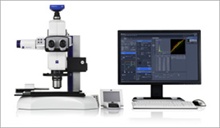Channels
Special Offers & Promotions
A new microscope class with a bright future
 With the Axio Zoom.V16, Carl Zeiss is defining a new instrument class in
microscopy. For the first time, zoom
microscopes are now combining typical benefits of stereomicroscopes such as
zoom optics and long working distances with the higher resolutions of
traditional light microscopes. In
comparable image fields, the Axio Zoom.V16 offers a 2.5 times higher resolution
and ten times brighter fluorescence than stereomicroscopes. With a 16x zoom range, the Axio Zoom.V16
surpasses all comparable microscopes currently available. An extensive line of
accessories enables configurations precisely tailored to many different
applications.
With the Axio Zoom.V16, Carl Zeiss is defining a new instrument class in
microscopy. For the first time, zoom
microscopes are now combining typical benefits of stereomicroscopes such as
zoom optics and long working distances with the higher resolutions of
traditional light microscopes. In
comparable image fields, the Axio Zoom.V16 offers a 2.5 times higher resolution
and ten times brighter fluorescence than stereomicroscopes. With a 16x zoom range, the Axio Zoom.V16
surpasses all comparable microscopes currently available. An extensive line of
accessories enables configurations precisely tailored to many different
applications. High-aperture zoom microscopes offer decisive benefits for many fields of application in biomedical research. Developmental biologists can localize individual cell groups in the overview of the entire embryo. These can then be observed in detail with high magnification and fluorescence illumination or digitally imaged and documented with powerful camera systems.
An illumination concept specially developed for zoom microscopes delivers considerably higher fluorescence illumination intensity, with even the smallest fluorescent structures remaining visible. Forensic scientists use this benefit, for example, to detect traces of DNA on textiles.
The Axio Zoom.V16 incorporates totally new approaches not only to visual observation, but also to imaging. Higher apertures substantially reduce the depth of field ranges in the focal plane. Structured illumination with the Apotome.2 slider system makes it possible to generate optical sectional images and 3D reconstructions of the specimens. Further leading-edge technologies in the future will increase the flexibility and application range of these zoom microscopes.
For more information, please visit www.zeiss.com/axiozoom
Media Partners


